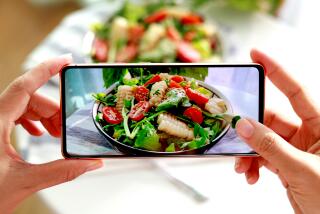Cancer Patient Needs Good Food, Support
Dear Dr. Blonz: I just wondered if you had any suggestions as to what I should cook for my mother, who is undergoing radiation and chemotherapy. I can cook well, so it’s not really recipes I am looking for, but a list of foods I can use to make things more manageable for her.
Are there foods that make one’s appetite reappear or that taste more appetizing after a treatment? Do some foods even help to calm the effects of treatment? How about vitamins? Can I give her those? Can I use milk products? Also, what can I do to cheer her up?
--A.S.
Dear A.S.: As your mother goes through her treatments, she will likely experience changes in her appetite as well as her perceptions of taste and smell. Cancer therapy is aimed at eliminating the fastest-growing cells in the body: the cancer. But the body has “normal” fast-growing cells, too, and these also tend to be affected--including the cells that line our digestive tract. That can lead to nausea and other digestive upsets. All these factors take their toll, often in an unpredictable way. The bottom line is that there aren’t foods that can reliably “turn on” one’s appetite.
To support your mother, you need to give her nutrient-dense foods that are high in calories. I recommend a plant-based diet that includes foods such as nut butters, soy foods and avocados, but be willing to follow your mother’s whims. Your abilities in the kitchen will pay off, as you will be able to take your cues from your mother’s changing needs and whip up great-tasting foods whenever she’s in the mood. Frequent, small meals are usually best. Milk products, if tolerated, are fine. A multivitamin supplement would be OK, but I would avoid megadoses, as you wouldn’t want to interfere with the cancer therapy. Make sure you discuss all of this with your mother’s oncologist and dietitian.
I recommend that you get a good reference book, too. Take a look at “Cancer Survivor’s Nutrition & Health Guide” by G. Spiller and B. Bruce (Prima, 1997). It focuses on eating well and getting better during and after cancer treatment. Another book on this topic is “Nutrition for the Chemotherapy Patient,” by J. Ramstack and E. Rosenbaum (Bull, 1990).
As for ways to cheer her up, I would encourage her to find others who have gone down the same road. Many can offer priceless advice and provide islands of joy amid the anguish. Ask your mother’s doctor for leads.
If you have access to the Internet, you can find an informal support group tailored to her specific type of cancer. I would caution you not to rely on these groups for medical advice, but I have participated in a number of online groups and have found them to be a good source of all-hours encouragement and support.
*
Dear Dr. Blonz: What is your opinion on vegetable juicing? I’ve been juicing carrots and cucumbers for the last two years. I drink this juice with my lunch and dinner--an average of 12 ounces per glass. Do you think this is too much natural sugar? Suzanne Somers says to stay away from carrots.
My overall diet is low-fat--mainly fruits in the morning and vegetables at lunch and dinner, with carbs and protein. I am 5-foot-7 and weigh 135 pounds. I exercise six days a week--15 minutes on the Health Rider in the morning, and then 45 minutes with weights and 10 minutes of aerobics. I have cellulite in my upper thighs and lower gut area. Do you think it is from the carrot sugar turning into fat?
I want your help because I love my carrot juice and I no longer drink dairy products. I do get calcium from soy yogurt, soy cheese and supplements.
--B.F.
Dear B.F.: That’s quite an impressive regimen. I wouldn’t be concerned about carrots--regardless of what a television personality might say. They are a great food. No food “turns to fat”; fat is created only when we take in more calories than the body requires. It comes down to a matter of caloric balance, so don’t let yourself be convinced otherwise.
Vegetable juices--especially those made fresh--are a great way to add nutrients to the diet, and they provide a wonderful flavor and aroma unmatched by bottled juices. A cup of carrot juice contains 94 calories with 22 grams of carbohydrates. It is also a rich source of carotenoids--anti-oxidant phytochemicals that are a proven health asset. Cucumbers represent a great source of potassium, magnesium and silicon.
Cellulite is a type of lumpy skin that develops when connective tissue attached to the skin and underlying muscles tightens over areas where there are fatty deposits. There is nothing special about cellulite. It has nothing to do with your carrots. If you lose the excess fat, the lumpiness disappears. The dilemma is that it often shows up in the areas where the body likes to store fat.
*
Ed Blonz is the author of the “Your Personal Nutritionist” book series (Signet, 1996). Send questions to: “On Nutrition,” Ed Blonz, c/o Newspaper Enterprise Assn., 200 Madison Ave., New York, NY 10016 or e-mail to ed@blonz.com. Personal replies cannot be provided.






